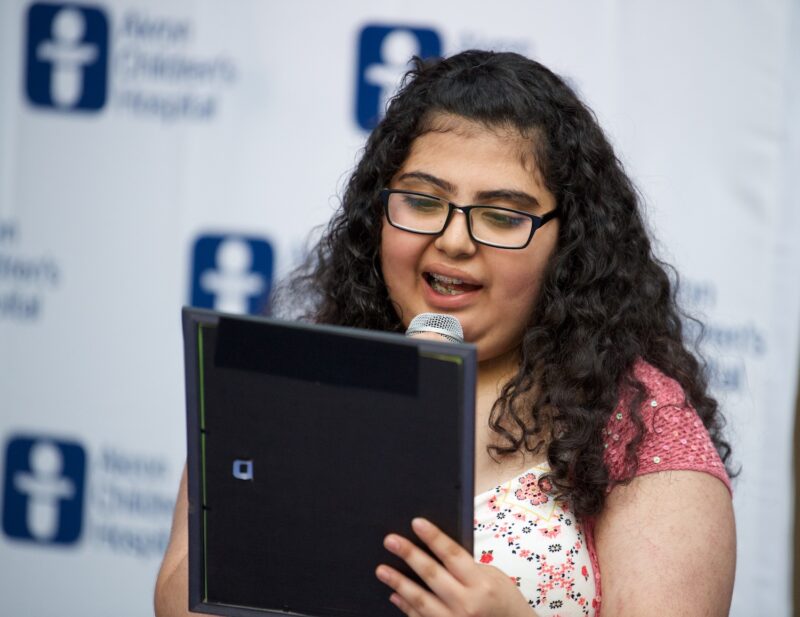
Telling their stories through narrative medicine is a powerful tool that supports patients on their health care journey.
As narrative medicine coordinator, Nicole Robinson witnesses on a daily basis the healing power of listening to the stories of our patients, their families and our hospital staff.
“Narrative medicine is the use of literary arts to help patients, families and staff tell and listen to stories,” she said. “For children and families, it may address specific treatment goals such as social and cognitive stimulation, pain management, self-expression, relaxation and stress management. Writing can improve depressive symptoms, anxiety and immune function. For providers and staff, it can enhance listening and communication skills to improve patient interactions, while promoting greater well-being.”
As a discipline, narrative medicine began in the early 2000s. Akron Children’s is the only pediatric hospital in the country with a full-time narrative medicine practitioner serving patients, families and staff. Nicole is based in the Haslinger Family Pediatric Palliative Care Center through the Emily Cooper Welty Expressive Therapy Center. She provides narrative medicine workshops for staff, provides inpatient consults throughout the hospital, leads workshops for behavioral health’s inpatient, partial hospitalization and intensive outpatient programs, and provides home visits for families receiving palliative care.
To get started, Nicole will first share a piece of writing or art to demonstrate the different tools that are available to convey a narrative. Next, she provides a writing prompt that addresses the specific treatment or workshop goals, which may inspire them to write about their experiences or health care journey.
As an example, Nicole recalled a patient who was undergoing treatment for cancer, while trying to be strong for her family.
“She didn’t want to talk about her experiences or be seen crying by her mom because she didn’t want to make her mom upset,” she said.
Likewise, the patient’s mother was trying to be strong for her child.
“Narrative medicine gave them the space to feel their feelings and connect them with each other and themselves, which ultimately improved family communication,” Nicole said. “At first, the patient was reluctant to share her writing, but she slowly began to share her writing with me and her mother. This led to future sessions with her mom, where through writing they were able to hear each other.”
In other cases, narrative medicine gives patients and their families a sense of control over experiences where they often don’t have a lot of control.
“If a family is feeling isolated or not heard, it may be more difficult to get them on board with treatment plans,” she said. “Along with shaping their narrative and being in control of how it is told, narrative medicine allows patients and families to feel heard and seen, and it enhances listening skills, so they are better able to hear their providers’ recommendations.”
Recently, Nicole, along with Drs. Sarah Friebert and Daniel Grossoehme, received a $20,000 research grant from Ohio Humanities to look at the ways narrative medicine can help parents while they have a child admitted to the Pediatric Intensive Care Unit.
Dr. Friebert, director of the Haslinger Family Pediatric Palliative Care Center and Expressive Therapy Center, shared, “We are blessed to be able to offer narrative medicine here at Akron Children’s through the generosity of the hospital and our wonderful donors. The support from Ohio Humanities allows us to expand our offerings and to continue important research to be able to spread the word about the importance of narrative medicine to other children’s hospitals and the rest of the medical community.”
Patient journals provide another resource
Other tools that patient families have to help them throughout their health care experiences are the All About Me Journal and the PICU Patient Journal.
“There is a lot of research, particularly in the adult ICU setting, about how these types of journals can help fill gaps in memory during a serious illness or accident,” Nicole said. “They can be very beneficial, because they have the potential to help a parent feel more connected to their child through writing. Also, because staff writes in the PICU Patient Journal as well, families can feel more connected to the team caring for their child.”
These documents provide a way for families to keep track of their hospital stay, such as the names of those involved in their child’s care, medications and treatment they received, questions for the nurses and doctors, and notes about going home.
Nicole is available to help parents use the PICU Patient Journal. She’s also been involved in research to expand the body of knowledge regarding narrative medicine in the pediatric setting.
Akron Children’s inpatients can self-refer to get an appointment with narrative medicine by calling 330-543-4909. Any health care provider can also place an order for an inpatient consult. Narrative medicine services are provided for children and families at no cost and do not require insurance coverage.










